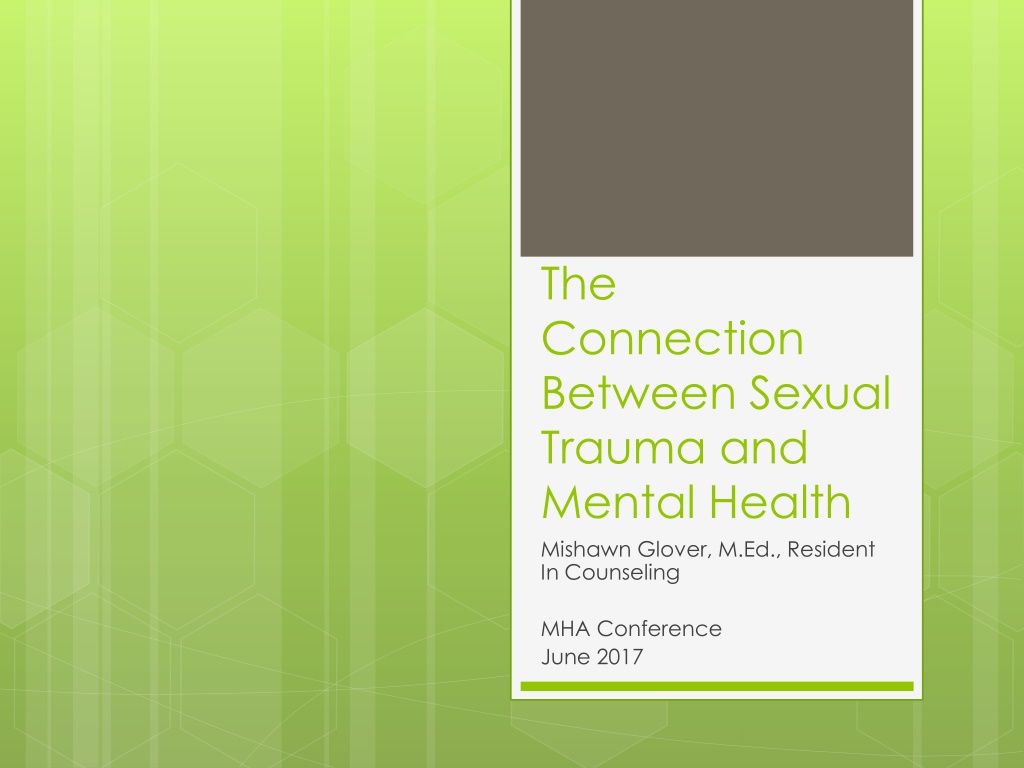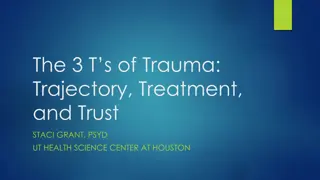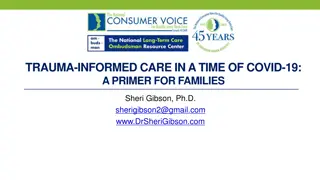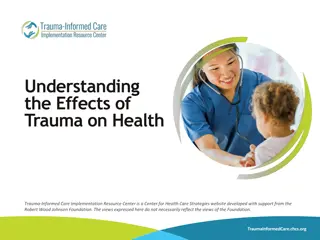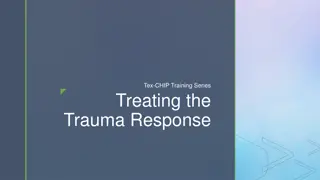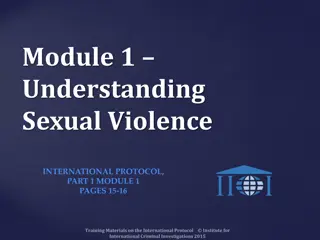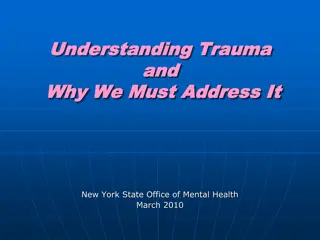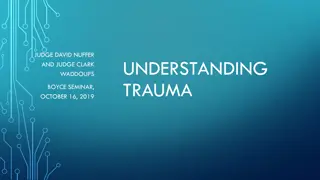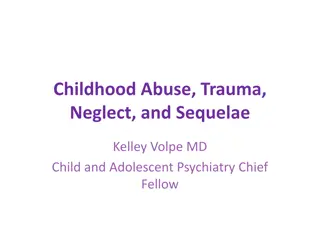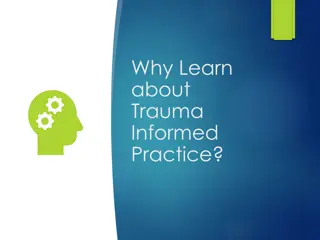Understanding the Link Between Sexual Trauma and Mental Health
Explore the profound impact of sexual trauma on mental health through an insightful session by Mishawn Glover, M.Ed., highlighting the definition of sexual trauma, its effects, barriers to treatment, and self-care strategies. Gain knowledge on the prevalence of sexual violence and its implications for individuals.
Download Presentation

Please find below an Image/Link to download the presentation.
The content on the website is provided AS IS for your information and personal use only. It may not be sold, licensed, or shared on other websites without obtaining consent from the author. Download presentation by click this link. If you encounter any issues during the download, it is possible that the publisher has removed the file from their server.
E N D
Presentation Transcript
The Connection Between Sexual Trauma and Mental Health Mishawn Glover, M.Ed., Resident In Counseling MHA Conference June 2017
Overview of the Session Introductions What is Sexual Trauma? What are the Mental Health Effects on Sexual Trauma? Barriers to Treatment Treatment Model Compassion Fatigue/Self-Care Closing
Who Am I? Master of Education in Counselor Education: Community Mental Health Resident in Counseling-LPC Currently a counselor for survivors of Intimate Partner, Domestic and Sexual Violence Hotline Crisis Specialist with the Virginia Sexual and Domestic Violence Action Alliance Certified Trauma Professional Clinical Family Child and Youth
Who Are You Introduction Activity Name What you do Something you require to feel safe in a learning environment Something you can contribute to a create a safe learning environment Nominate 1 recorder and 1 reporter Pick 1 Requirement and 1 Contribution to report back to everyone
Sexual Trauma Sexual Violence or Sexual Assault Sexual behavior that occurs without the clear CONSENT of the victim Attempted rape Fondling or unwanted touch Forcing victim to perform sexual acts Penetration of victim s body Mental Health American, RAINN, West Virginia University
Facts and Stats 1 in 5 women and 1 in 71 men will be raped at some point in their lives 46.4% Lesbian, 74.9% bisexual women and 43.3% of heterosexual women report sexual violence other than rape during a lifetime, while 40.2% gay men, 47.4% bisexual men and 20.8% heterosexual men reported sexual violence other than rape during their lifetimes National Sexual Violence Resource Center, 2015
Facts and Stats Cont Each rape costs approximately $151,423 81% of women and 35% of men report significant short-term or long-term impacts such as PTSD Health care is 16% higher for women who were sexually abused as children Sexual Violence is NEVER the victim/survivors fault!!! National Sexual Violence Resource Center
What does mental health have to do with it? Activity: Holding on to secrets
Mental health effects on Sexual Trauma Trauma is a brain thing Trauma is something that overwhelms our coping capacity Trauma activates our survival responses Fight Flight Freeze
Long-Term Effects of Sexual Violence Feelings of guilt and shame Lonely Different Sad/Depressed Confusion Anger Fear Dissociation Intrusive thoughts Rigid or lack of boundaries Difficulty forming Close relationships Trust/Intimacy Issues
Mental Health Disorders Associated with Sexual Trauma Eating Disorders Anxiety Substance Abuse PTSD Depression
Treatment Needs of Survivors Freedom to explore, process and grow Treatment should be facilitative Awareness of own body language, feelings, beliefs, etc. Comfortable with talking about sexual trauma The focus of treatment should be client centered
HEAL Model Stabilize Normalize Rationalize Help Trauma and Brain Self-Regulation Storytelling Educate Feelings Affirm Empowerment Resiliency Celebrate Liberate
Help Assessing for Safety They are having a normal reaction to an abnormal experience Stability as a precursor to treatment improves the outcome for treatment
Educate Teach about how the trauma has effected their brain Teach self-regulation techniques Relationships and Trust Healthy vs. Unhealthy Sex vs. Love Respect Boundaries Assertiveness Skills Family dynamics Help the survivor tell their story Narrative therapy Art
Affirm Feelings Address Connect Identify Activities to help may include: Mask Positive Self-Talk Mantras Mirror exercises
Liberation Continue to let the survivor know you believe them and what happened to them is not their fault Celebrate milestones survivors overcome in treatment Plan a celebration for all the hard work the survivor has done when termination happens.
Take Care of Self! Activity: Self-Care Plan
